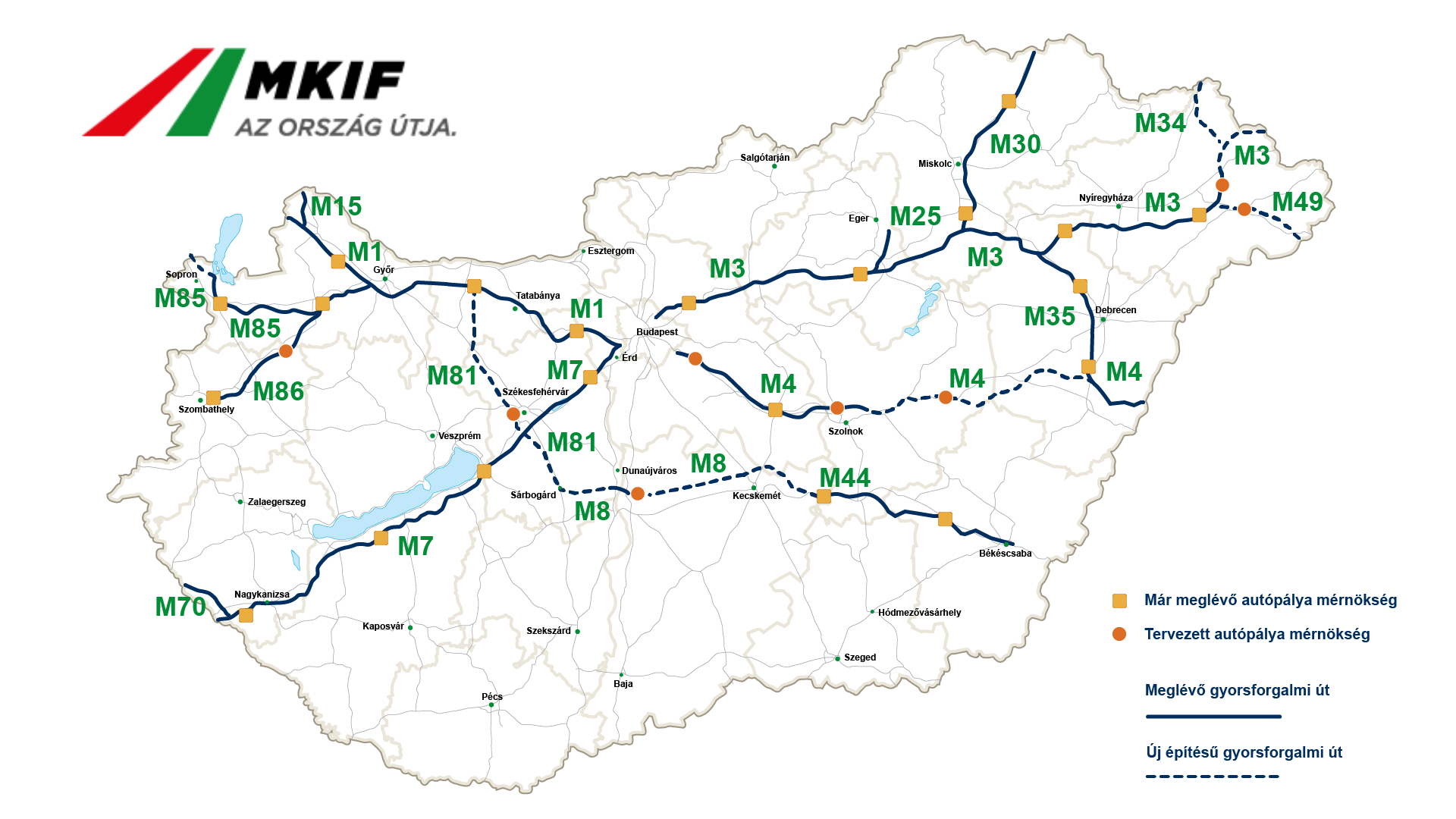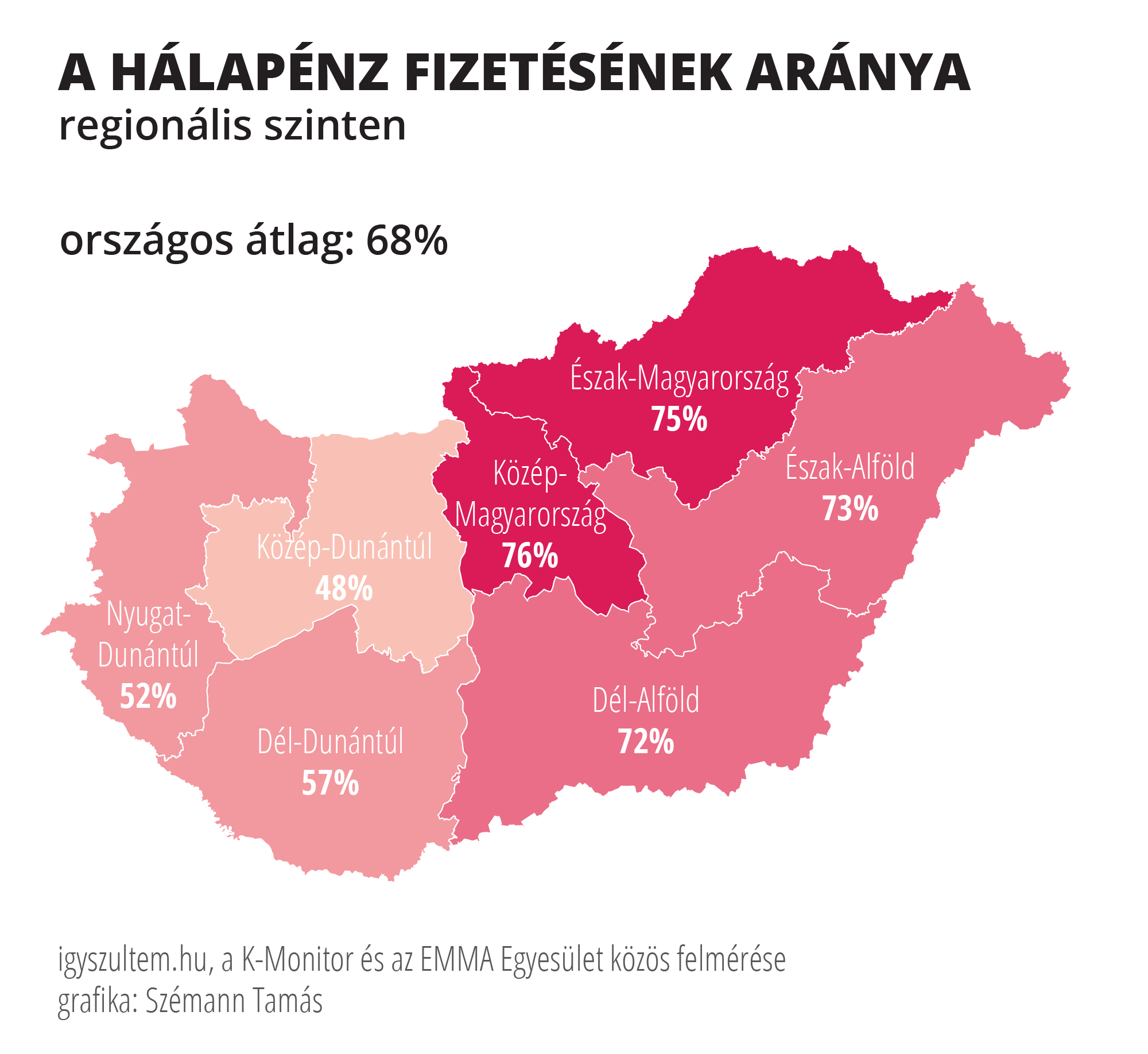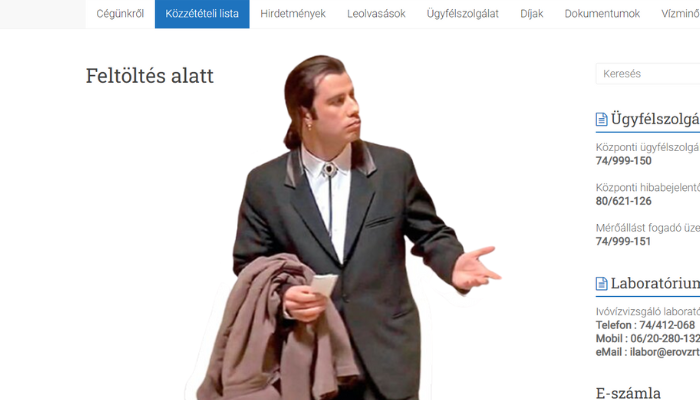A kormány a választások előtt egy meglehetősen fura eljárásban privatizálta a gyorsforgalmi hálózat nagyobbik részének építését és kezelését, azt 35 évre magáncégeknek adva. A koncessziót végül komoly verseny nélkül egy Mészáros Lőrinc és Szíjj László NER oligarchákhoz kötődő csoport nyerte el, így ők bonyolíthatják többek között a következő évtized nagy útépítéseit anélkül, hogy egyetlen tenderen is el kellene indulniuk. Ezekre az állam a gazdasági helyzettől függetlenül kötelezettséget vállalt. Most kikértük és megkaptuk a teljes ajánlattételi dokumentációt, ami sok konkrétumot tartalmaz arra vonatkozóan, pontosan mit és milyen szabályok mentén csinál a nyertes.

fotó: Magyar Közút
Nem nekik fizetjük az útdíjat, meghitelezik az államnak a sztrádaépítést
Az ügylet számos részlete tisztázatlan, arról csak nyilatkozatokból lehetett értesülni - többek között arról, hogy a nyertes magántőkealapok mögött kik állnak. A konstrukciót Rogán Antal felügyelete alatt készítették elő, ám a szerződések nyélbe ütése után a felügyelet a nagy rivális jelenlegi építési miniszterhez, Lázár Jánoshoz került.
A koncessziós cégek (MKIF) már szeptember 1-től 1237 km gyorsforgalmi útszakasz üzemeltetési feladatát vették át. A gyorsaság az ő szempontjukból indokolt, hiszen minél hamarabb kezdik el a munkát, annál hamarabb jogosultak a kilométerenként járó, fix díjazásra. Illetve, minél hamarabb vágnak bele a vállalt építkezésekbe, annál hosszabb lesz az az időszak, ami után a kilométerarányos, megnövelt "rendelkezésre állási díj" jár a számukra a 35 éves időszakon belül. Jövőre a költségvetésbe 229,955 Mrd Ft van betervezve RÁD-ra, ez megy a nyertes Themis konzorciumnak.
A gyorsforgalmi koncesszió ajánlattételi dokumentációja
A teljes anyag Google Drive-on
Útmutató a jelentkezőknek (ez kvázi egy részletesebb összefoglaló)
1. A koncessziós modell keretében bevonásra tervezett meglevő és célzott hálózati elemek illusztrációja és a műszaki beazonosíthatóságot szolgáló dokumentumok
(Itt olvasható részletesen, mi tartozik a koncesszióba, mely szakaszokon milyen feladata lesz a koncesszornak. Ezek az adatok már megjelentek a sajtóban)
2. Üzemeltetés, karbantartás SLA (szolgáltatási szint megállapodás) dokumentumok
(Az üzemeltetéshez szükséges, döntően a Magyar Közút tulajdonában lévő vagyonelemek átadásával kapcsolatos adatok. Ezeket kellett a koncesszornak megvásárolnia).
Építés SLA (szolgáltatási szint megállapodás) dokumentumok
(A beruházások az azóta megszűnt NIF-hez tartoznak. Ezek a dokumentumok tartalmazzák, hogy a már megkezdett, megtervezett építkezések, amelyek a koncesszió alá tartoznak, hogyan kerülnek átadásra).
A több ezer milliárdos üzlet annyiban előnyösebb, mint a korábbi sztrádakoncessziók, hogy nincs az euro-elszámolás miatti ráfizetés az árfolyamkockázat miatt, de hogy pontosan mekkorát nyertek Mészárosék, az számos olyan részlettől függ, amit jelenleg nem lehet megmondani. Ilyen bizonytalanság például a finanszírozási háttér megteremtése, vagyis a felvett hitelek, hiszen a következő 10 év nagy fejlesztéseit még Mészáros és Szíjj sem tudja saját vagyonából kifizetni, banki piaci hitelfelvétel nélkül az állam által fizetett összeg önmagában erre nem elég. Az elmúlt évek gyakorlatát figyelembe véve azonban nem lenne meglepő, ha a hitelezésben állami szereplők is részt vállalnának. Az állam örülhet, hogy a fejlesztéseket nem kell most kifizetnie, "hitelbe kapjuk" azokat Mészároséktól, amiért 35 évig törlesztünk (de nem számít államadósságnak).
A "koncesszió" a fejlesztések szempontjából inkább egy szabálytalanul nagy és összetett közbeszerzésnek tűnik, hiszen az útdíjat nem ők határozzák meg, szedik be és az ebből fakadó kockázatokat sem a koncesszor viseli. A tendernyertes a következő évtizedben 272 km új gyorsforgalmi utat épít, 273 km-en pedig bővíti a már meglévő hálózatot. Hogy ez pontosan mennyibe kerül a NER nemzeti nagytőkéseiknek, ha nem egy állami közbeszerzésen tesznek ajánlatot, hanem saját szakállukra építenek, nehezen megjósolható. A G7.hu előzetes becslése szerint - ha a finanszírozás költségeit nem vesszük figyelembe - nagyságrendileg 30 százalékos profittal számolhat a sztrádakoncessziót elnyerő Mészáros-Szíjj páros, ami mai áron évi 46 milliárd forint. Kérdés azonban, hogyan módosulhatnak a feltételek, kaphatnak-e az M5, M6 opcionális átvételén túl újabb megbízásokat vagy sztrádaelemeket, és ha igen, milyen ellentételezésért. Ez az ajánlattételi dokumentáció alapján sem világos.

A munka másik része a fenntartás, méghozzá egy, az ajánlattételi dokumentációból részletesen megismerhető pontrendszer alapján, ami a kiíró szerint magasabb minőségű szolgáltatást jelent a sztrádák használóinak. Arról nem szóltak hírek, hogy bármi gond lett volna a feladatot eddig elvégző Magyar Közút (MK) munkájával, amiért ezt a feladatot át kellett adni koncesszióba. Ráadásul szeptember elejétől a feladatot a koncesszor a MK korábbi munkavállalóival és annak eszközeivel végzi, a cég úgy kezdi a munkáját, hogy érdemi többletképességet nem hozott be. Az elmúlt évtizedekben uniós forrásból bővített, jó állapotú gyorsforgalmi hálózat elcsatolása után is az állami cégnél maradnak a - kevésbé jó állapotú - egyéb állami utak. Az állami cégnek semmiféle nyeresége nem volt a koncessziós hálózat leválasztásából: a megismert adatokból az derül ki, hogy a sztrádák kezeléséhez kapcsolódó eszközeiket könyv szerinti áron adták el Mészároséknak, így szó nincs arról, hogy az országos közutak fenntartása profitálna a koncessziós modellből.
Az adatok alapján egy fillért sem fizettek rá Mészárosék Közút üzletágának megvásárlására
A koncessziós kiírás része volt, hogy a nyertesnek meg kell vennie a Magyar Közút üzletágát (telepeit, eszközeit). Tompos Márton momentumos képviselő tett fel kérdést Lázár János minisztériumának, mennyiért szerezte meg a hálózat üzemeltetéséhez szükséges (ingó és ingatlan) eszközöket, készleteket, egyéb szükséges vagyonelemeket a koncessziós MKIF. A minisztérium válasza szerint a koncesszió jogosultja szeptember 1-el már átvette a szükséges eszközöket a Magyar Közúttól. Minderre egy üzletág-átruházási megállapodás keretében került sor, aminek részeként
- 5 mérnökségi épület [*ennél több kerül átadásra, de nem mind a MK-tól]
- 19 388 darab "eszköz"
- 2,6 milliárd forintnyi "készlet" került a koncessziós céghez
- amely 889 dolgozót is átvett.
- Mindezért Mészárosék 17,8 milliárd forintot fizetnek.
- Ebben értelemszerűen nincs benne a kezelésre megkapott teljes úthálózat, hiszen ennek továbbra is az állam a tulajdonosa. Ennek könyv szerinti értéke nagyjából 2.420 milliárd forint.
Az eszközöket, épületeket a 35 év lejártával az állam vissza fogja kapni. Az ajánlattételi dokumentációból képet kaphatunk, milyen eszközökről és készletekről van szó. A szóban forgú eszközökről egy 18.698 elemű listát tartalmaz a dokumentáció azaz ennél több eszköz került végül átadásra. Ezek beszerzési értéke 19,5 milliárd forint, értékcsökkentett, könyv szerinti értéke pedig 12,3 milliárd forint volt. Benne járművek (pl. 2017-es Skoda szgk. 0 Ft-on), mobiltelefonok, háztartási gépek, számítógépek, bútorok, munkaeszközök. A lista nem a tényleges ár, arról később egy értékbecslés is készült. A megvételre kötelezett készletek könyv szerint 1,9 milliárd forintot értek (vagyis itt is több mindent vett meg a koncesszor, mint amit az ajánlattételi dokumentáció tartalmaz). Itt egy 17.675 elemű listát tartalmaz a dokumentáció, benne selejt, jégakku, csizma, balta stb. A koncessziós cég vezetője az RTL.hu-nak azt mondta: üzleti titok, mennyiért vették meg ezeket, a minisztérium mégis elárulta, a dokumentumok osszevetése után az látszik: Mészárosék a minimális összeget fizették ezekért.
Az átadásban az is pikáns, hogy ezen eszközök egy részét Mészáros Lőrinc és öccse, Mészáros János cégeitől vette a Magyar Közút az elmúlt években. János cégei polipként fonták körbe a MK eszközbeszerzéseit, tucatnyi alkalomman szállítva nekik különböző eszközöket. Mészáros Lőrinc autós cége, a Mészáros M1 Autókereskedő Kft. pedig egy 3,8 milliárd forintos közbeszerzést nyert el 313 db könnyű-tehergépjármű és speciális könnyű-tehergépjármű biztosítására, ezt később módosítani kellett, mert a MK-nak már nem kell annyi autó, lévén nem ő látja el a sztrádák kezelését.
Az ajánlattételi dokumentáció megismerése mellett egy másik fontos adat, a megtérüléssel kapcsolatos háttérszámítások is kellenének a modell jobb megértéséhez. Ezért a TI Magyarország perel, várhatóan hamarosan megszületik a végső ítélet az ügyben. Az évi több száz milliárdos pénzáramlással járó tranzakciót azonban ezután is érdemes lesz figyelnünk, mert még számos nyitott kérdés van.
Változnak-e a dokumentációban megadott keretszámok, változik-e a kifizetett díj, kerülhet-e be új útszakasz a koncesszióba az opción (kifutó M5, M6 koncessziók) felül? Hogyan számolnak majd el a felek, ha később jön egy rendkívüli feladat, pl lehajtót kell építeni egy kezelt szakaszra? Vajon megállja a kormányzat, hogy (főleg most, hogy nincs pénze fejlesztésekre) nem lapátol bele utólag elemeket a konstrukcióba, súlyosan korlátozva ezzel a piaci versenyt, áthárítva a fizetést a következő évtizedek kormányaira?
Miért jó az az államnak, hogy a jelenleg futó beruházásokat (M44, M85, M4, M49, M34) ő állja, de ezeket egyből átadja a koncesszornak üzemeltetésre, vagyis beruházás nélkül növekszik a hálózat hossza és ezzel a rendelkezésre állási díj, ráadásul az új útvonalak karbantartásával sem lesz igazán sok költsége, vagyis a "szintre hozás" sem áll meg?
Vajon mennyivel lesz áttekinthetetlenebb az állami koncessziós építkezések ütemezése? Az eddig ezeket bonyolító NIF-nek bejáratott kommunikációja, rendszeres adatközlése volt, de a cég most megszűnt. Vajon kiad a koncessziós cég valamilyen nyilvános ütemtervet, ami mentén a következő 10 évben halad?
Vajon meglesz az összhang a koncessziós cég fejlesztései és az állami fejlesztések között? Mi van például az M1 bővítésével: a koncesszor jövőre már kezdené a Bicske utáni, koncessziós kezelésben lévő szakasz bővítését, de Bicskéig az államnál marad a sztráda és ezt a bővtést viszont lefújták.
Vajon meglesz az összhang az építkezések során a lezárások, terelések esetén? Itt nyilvánvaló érdekellentét van az építkezést pörgetni akaró koncesszorral, ez pedig járhat kellemetlenségekkel és torlódással.
Hasznosnak tartod a munkánkat? Segítenél?









